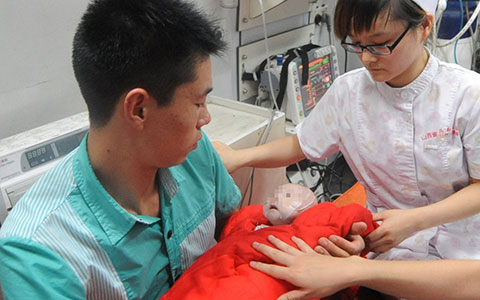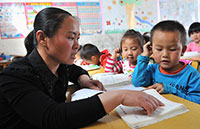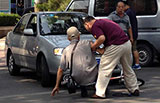National Human Rights Action Plan of China (2012-2015)
(Xinhua) Updated: 2012-06-11 16:20(4) Senior citizens' rights
China implements the Law on the Protection of the Rights and Interests of the Elderly, gradually improves the old-age security system, pushes forward the construction of old-age service system, and guarantees the legitimate rights and interests of the elderly.
- The state will improve the old-age social security system that covers both urban and rural residents. The government will provide basic pensions for rural residents and unemployed urban residents above 60 years old, and issue reward and support subsidies to parents in rural areas who are both above 60 and who have only one child or two daughters, preliminarily realizing universal coverage for all senior citizens.
- The state will improve preferential treatment measures for the elderly, actively providing various forms of preferential treatment and prioritized and preferential services to the elderly, and gradually increasing the level of social welfare for senior citizens.
- The state will improve the support policy for home-based old-age care. The state will improve the administrative policy of household registration transfer for elderly people, thus creating conditions for the transfer of senior citizens along with their providers. It will also improve policies that support and encourage home-based care and security services for elderly people.
- The state implements the Program for the Construction of Old-age Social Service System (2011-2015). By 2015, the state will increase the number of beds in day-care facilities and nursing homes by 3,420,000, and extend support to the establishment of not-for-profit nursing homes by private businesses.
- The state will improve the basic medical insurance for the elderly. Grassroots-level medical care services will provide health management services to local residents above 65 years old, and establish and keep health profiles for them.
- The state will enrich senior citizens' cultural lives. The state will increase financial investment into the construction of colleges for senior citizens, enlarge the scale of such schools, increase the supply of public cultural products for the elderly, organize public fitness activities for them and provide convenience for their participation in voluntary programs. In order to promote senior citizens' participation in social life, the state will make sure that at least 95% of urban communities and 80% of rural communities have their own senior citizens' associations by 2015.
- The state will promote the construction of elderly-friendly cities and livable communities for senior citizens. The state will comprehensively implement the technological standards of urban and rural construction projects related to senior citizens, as well as the standards of renovation of barrier-free facilities and the construction of facilities for the elderly in newly-built communities.
- The state will expand channels of legal assistance for the elderly and the emphasis is to provide legal services to citizens of advanced age, and senior citizens who live alone, are disabled or have any other physical difficulty.
(5) Rights and interests of the disabled
China develops undertakings relating to the disabled, improves social security and services for them, and protects their lawful rights and interests.
- The state will implement the Law on the Protection of the Rights and Interests of the Disabled and improve relevant supporting laws and regulations. The state will formulate regulations on the construction of barrier-free environments, research and formulate regulations on the rehabilitation of the disabled, and research and revise the regulations on education for the disabled.
- The state will include the disabled people in both urban and rural areas in the basic endowment insurance and basic medical insurance according to relevant regulations. The state will establish a life subsidy system for the financially-challenged disabled population and nursing care allowances for the severely disabled, in an effort to supply a steady institutional guarantee for the basic life of the disabled.
- The state will comprehensively carry out community-based rehabilitation services. The state will help 13 million disabled people obtain rehabilitation to various degrees through the implementation of key rehabilitation programs, organize the supply of five million pieces of supporting devices of various types and provide basic supporting devices for those in need. It will also provide subsidies on 1.6 million occasions for community or household services for people suffering from mental disabilities and diseases, as well as for seriously disabled people.
- The state will raise the education level of the disabled. The state will make sure that school-age disabled children generally receive compulsory education. It will promote compulsory education for disabled children in such a way that they attend the same classes as other healthy children where convenient, providing education for disabled people that suits their needs and capacities. The state will develop pre-school rehabilitation education for disabled children and vocational education for the disabled, promoting senior high-school education and higher education for the disabled, and reducing illiteracy among the young and middle-aged disabled population.
- The state will stabilize and expand employment for the disabled. The state will provide employment services and vocational training for disabled people who seek employment, and make sure that an additional 800,000 disabled people will be employed by 2015.
- The state will strengthen development-oriented poverty reduction programs for the disabled population in rural areas. The state will help eight million needy disabled people in rural areas to improve their living conditions, increase their incomes and enhance their abilities for development. The state will provide skills training for 800,000 disabled people in rural areas, and continue to implement the "sunshine housing project" to improve the housing conditions of impoverished disabled people in rural areas.
- The state will require public cultural facilities to give access to the disabled free of charge or at preferential rates. The state encourages the construction of digital reading rooms for the blind in public libraries in areas that are capable of doing so, opens public sports facilities to the disabled gratis or at preferential rates, and carries out mass cultural and sports activities that conform to the physical and psychological characteristics of the disabled.
- The state will quicken the construction and renovation of barrier-free facilities. It will create barrier-free cities, counties and districts nationwide, strengthen the construction of barrier-free facilities of public transport including the railway, as well as the construction of information accessibility. The state will carry out renovation of barrier-free facilities for families of the disabled and subsidize those who have financial difficulties in the renovation.
- The state will expand the scale of publications in braille. It will strengthen the construction of publishing bases of braille books, and realize the annual production goal of 700,000 copies of such books and periodicals in 1,600 titles. It will also develop music scores for the blind, as well as reference books, periodicals, digital audio books and encyclopedias for them.
- The state will improve a coordinating work mechanism of legal assistance to the disabled. It will improve legal assistance to the disabled to protect their rights and interests by law.
- Man deported to China in test-taking scandal
- 155 Chinese workers pardoned
- Govt, business propose quantum leap
- Ex-environmental official held in probe
- 'Truth' sought after claims made against Shaolin abbot
- 38.7b yuan in State assets recovered in campaign
- China's future megalopolis gathers momentum as young people return
- Eyes focus on the games as showgirls cover up
- Demand for English-speaking staff soar at workplaces
- Chinese like shopping on US websites







